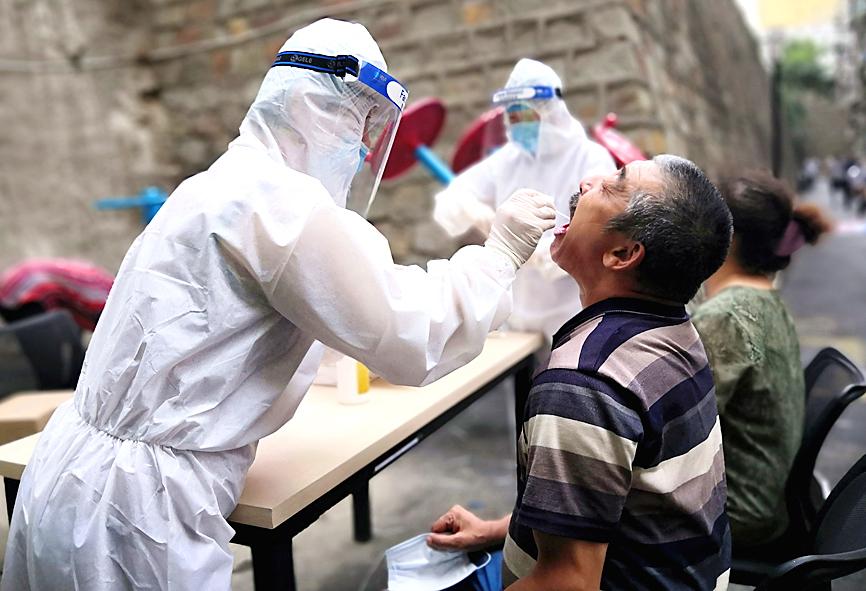Residents in China’s northwestern Xinjiang region have complained on social media about what they say are harsh COVID-19 lockdown measures in the sensitive region after a local outbreak.
China had largely brought domestic transmission under control through lockdowns, travel restrictions and testing, but sporadic regional outbreaks have emerged.
A new cluster in Xinjiang’s capital, Urumqi, in the middle of last month prompted fresh restrictions, with 902 cases officially reported.

Photo: Reuters
Officials said this month they had “effectively contained” the spread of the Urumqi cluster, and there have been no new cases reported in the past eight days.
However, hundreds of residents have gone on to local social media forums in the past few days to complain about harsh conditions.
With some of the comments removed, users tried to also voice their complaints on local forums on the Sina Weibo (微博) platform in Beijing, Shanghai and Guangzhou.
Social media users shared photographs of front doors sealed with steel crowbars, and locks installed by community workers.
“Why can’t prefectures with no cases remove the lockdown? Why do you need to lock down the whole of Xinjiang?” read one comment on Weibo, which received thousands of likes.
“Doors have been sealed, this has brought huge inconvenience to workers and people’s lives. Prices of daily items have risen ... many things I buy are expired” read another.
Some residents also wrote that they were forced by authorities to take Chinese medicine daily, and were required to film themselves doing so.
One video from Saturday showed dozens of high-rise residents in Urumqi yelling from their windows in despair.
Stranded migrant workers, university students, business travelers and tourists also complained about not being able to leave Xinjiang.
“I have even taken three nucleic acid tests ... but community workers won’t let me leave,” one user wrote on a message board run by the state-run People’s Daily.
Urumqi authorities yesterday said that lockdowns would be eased in areas that had no virus cases, according to a report in the state-run tabloid Global Times.
About half of Xinjiang’s more than 21 million people are ethnic Uighurs and other Turkic Muslims, many of whom complain of decades of political and religious oppression by the Chinese Communist Party, which the government denies.
Activists have accused the Chinese government of incarcerating about 1 million Uighurs and other Turkic people in Xinjiang camps.
Beijing has described them as vocational training centers to counter Islamic radicalism.

ACTION PLAN: Taiwan would expand procurement from the US and encourage more companies to invest in the US to deepen bilateral cooperation, Lai said The government would not impose reciprocal tariffs in retaliation against US levies, President William Lai (賴清德) said yesterday, as he announced five strategies to address the issue, including pledging to increase Taiwanese companies’ investments in the US. Lai has in the past few days met with administrative and national security officials, as well as representatives from various industries, to explore countermeasures after US President Donald Trump on Wednesday last week announced a 32 percent duty on Taiwanese imports. In a video released yesterday evening, Lai said that Taiwan would not retaliate against the US with higher tariffs and Taiwanese companies’ commitments to

Intelligence agents have recorded 510,000 instances of “controversial information” being spread online by the Chinese Communist Party (CCP) so far this year, the National Security Bureau (NSB) said in a report yesterday, as it warned of artificial intelligence (AI) being employed to generate destabilizing misinformation. The bureau submitted a written report to the Legislative Yuan in preparation for National Security Bureau Director-General Tsai Ming-yen’s (蔡明彥) appearance before the Foreign Affairs and National Defense Committee today. The CCP has been using cognitive warfare to divide Taiwanese society by commenting on controversial issues such as Taiwan Semiconductor Manufacturing Co’s (TSMC, 台積電) investments in the

‘SPECIAL CHANNEL’: Taipei’s most important tasks are to stabilize industries affected by Trump’s trade tariffs and keep negotiations with Washington open, a source said National Security Council Secretary-General Joseph Wu (吳釗燮) arrived in the US for talks with US President Donald Trump’s administration, a source familiar with the matter said on Friday. Wu was leading a delegation for a meeting known as the “special channel,” the Financial Times reported earlier. It marked Trump’s first use of the channel since returning to the White House on Jan. 20. Citing a source familiar with the matter, the Financial Times reported that Minister of Foreign Affairs Lin Chia-lung (林佳龍) was also a part of the delegation. The visit came days after China concluded war games around Taiwan and amid Trump’s

HELPING HAND: The steering committee of the National Stabilization Fund is expected to hold a meeting to discuss how and when to utilize the fund to help buffer the sell-off The TAIEX plunged 2,065.87 points, or 9.7 percent, to close at 19,232.35 yesterday, the highest single-day percentage loss on record, as investors braced for US President Donald Trump’s tariffs after an extended holiday weekend. Amid the pessimistic atmosphere, 945 listed companies led by large-cap stocks — including Taiwan Semiconductor Manufacturing Co (TSMC, 台積電), Hon Hai Precision Industry Co (鴻海精密) and Largan Precision Co (大立光) — fell by the daily maximum of 10 percent at the close, Taiwan Stock Exchange data showed. The number of listed companies ending limit-down set a new record, the exchange said. The TAIEX plunged by daily maxiumu in just